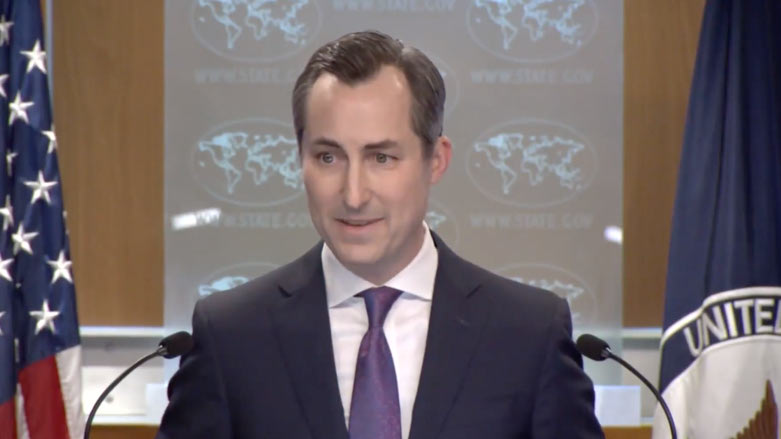U.S. ‘Urges Progress’ on Resuming KRG Oil Exports
“We have been clear on our position and our support for the resumption of oil exports from northern Iraq,” Miller said.

WASHINGTON DC, United States (Kurdistan 24) – State Department Spokesperson Matthew Miller has reaffirmed Washington’s support for renewing the export of oil from the Kurdistan Region.
“We have been clear on our position and our support for the resumption of oil exports from northern Iraq,” Miller told journalists on Monday.
Oil exports from the Kurdistan Region to Turkey’s Mediterranean port of Ceyhan were halted some three months ago—on March 25, after a court decision in a case that was first brought before it in 2014.
The Kurdistan Regional Government (KRG) had been using part of the Iraq-Turkey Pipeline (ITP) to Ceyhan to export its oil—some 370,000 bpd. In addition Iraq’s federal government was using the pipeline to export 75,000 bpd, and the Iraqi exports were halted as well.
Read More: U.S. Calls for Resuming Kurdish Oil Exports—after adverse ruling in nine-year-old arbitration case
Background: Nuri al-Maliki’s Poor Relations with KRG
Turkey’s halt to Iraqi and Kurdish oil exports followed an adverse ruling issued by the International Chamber of Commerce’s International Court of Arbitration (ICC-ICA), which ordered Turkey to pay Iraq $1.5 billion for unauthorized oil exports from the Kurdistan Region between 2014 and 2018.
The case was initially brought to the ICC-ICA by Iraq nine years before, when Nuri al-Maliki was prime minister.
Maliki led a highly sectarian Shi’ite government, and that contributed to discontent among Iraq’s Sunni Arabs and the rise of ISIS. Thus, when ISIS burst out of Syria into Iraq in the summer of 2014, threatening both Baghdad and Erbil, U.S. President Barack Obama insisted on Maliki’s resignation as a condition for U.S. support to Iraq in fighting the terrorist organization.
At that point, relations between Baghdad and Erbil were quite tense. Kurdish President Masoud Barzani urged Maliki not to seek a third term, and Maliki responded by charging that Erbil was a malign force: “a headquarters for ISIS, Baathists, al-Qaeda and terrorists.”
That was ludicrous, but it reflected the character of the Iraqi regime that initiated the lawsuit in 2014, which is now causing so much trouble—even though Kurdish oil exports had, in fact, begun five years earlier, in 2009.
Steps to Renew Kurdish Oil Exports
Following the Turkish halt to their oil exports, Iraq and the Kurdistan Region seemed to reach a quick agreement on resuming them. On April 3, the Kurdish Prime Minister Masrour Barzani visited Baghdad, where he met with Iraqi Prime Minister Mohammad Shia Al-Sudani, and they announced a deal.
Read More: Deal to resume Kurdish oil exports reached
But the announcement proved premature, as pro-Iranian elements in the Iraqi government blocked its implementation. Above all, the Iraqi Oil Ministry needed to make the request to Ankara to resume oil pumping, and it was slow to do so.
However, a month later, on May 10, it did. Iraq’s State Oil Marketing Operation (SOMO) made a formal request to Ankara to resume oil exports.
Read More: Baghdad and Erbil wait for Turkey’s response before resuming oil exports: KRG
Over a month has passed since then, but Turkey has yet to restart the oil exports.
A week ago a Turkish energy technical delegation visited Baghdad to meet with Iraqi oil officials on resuming them.
The U.S. welcomed that meeting, as Miller told journalists on Monday. “We’re glad to see that officials from Iraq and Türkiye met on June 19th to discuss a resumption of [pipeline] operations, and we’ll continue to urge progress,” the State Department Spokesperson said.
It is unclear just what the problem is in restarting the oil exports. A Reuters report suggested that it was a political, rather than technical, issue, and that Turkey was delaying the resumption of exports as leverage in talks with Iraq to reduce the size of the damages it is obliged to pay.
More than any other party, the Kurdistan Region has been hurt in this dispute. Reuters estimated that, with the halt in its oil exports, Erbil has lost over $2 billion in revenues.